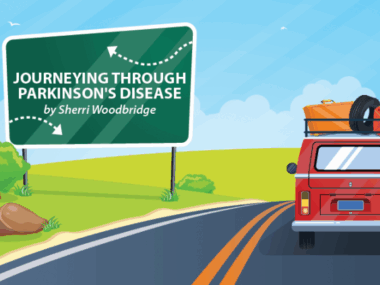Figuring out what it means to live authentically with Parkinson’s
Here's one little lie that we all tell ourselves from time to time
Written by |

The word “fine” can mean many things, from superb to satisfactory to precise, and even delicate, depending on its usage. Merriam-Webster also lists its synonyms, which include acceptable, decent, middling, and passable. When I look at these words, “fine” seems to cover many conditions.
That’s why it’s a handy word to describe how you are doing. It can mean almost anything.
Most of us are polite and take a moment to greet people we know when they cross our paths. We’ll say things like, “Hi! How are you?” The greeter doesn’t really want an actual answer, and the responder doesn’t really want to give one, either. So we say, “Fine!” and move along.
When we get home, we can tell our spouse, “I saw Mollie today. She said she was doing fine.” This exchange allows us to walk away thinking that we’ve satisfied the social norm without having to share the best and worst of what’s happening with us. Box ticked.
Magical thinking
After my Parkinson’s disease diagnosis in 2013, I found myself frequently saying, “I’m totally fine. I just have Parkinson’s.” That statement is absolutely true, yet absolutely idiotic.
I am fine. I am. I have a warm, dry, welcoming place to live and access to good food and nutrition. I have such excellent access to clean, drinkable water that I bathe in it daily. I have good doctors and insurance that provide me access to effective medication and other treatments for my Parkinson’s. I have a loving husband, family, friends, and work that I enjoy, which is valued enough by society that I can earn money to support myself and enjoy leisure time. I am fine.
But I’m also not fine.
You might think that nearly 12 years after my diagnosis, I’d be used to dealing with it by now. But I don’t think you ever really get over the “magical thinking” that comes with the diagnosis of a devastating, chronic illness. You feel like you have to keep telling yourself and others, “I’m going to be fine.” If I say it enough, maybe I can make it true.
But there’s a massive gap in the reality of being superb, for example, and being middling. It’s a gap that you can’t bridge by telling yourself and others that “it’s fine.”
I’ve never been one for pity, so even before my diagnosis I was always fine. But I also need to acknowledge and give myself permission to say when I have moments that are not.
Today, when I say, “I’m fine,” I usually mean it. At the moment I’m asked, I probably am. The next moment, though, I may not be. And that’s OK, too. I don’t always have to be fine to be useful or productive. And the less stress I put on myself by insisting that I’m fine, the more fine I likely will be.
Being fine is a hard habit to break. So I continue to try to live authentically and to learn to be authentically not fine. It’s OK to be where I am. If I can learn to manage that, everything else will be fine.
Note: Parkinson’s News Today is strictly a news and information website about the disease. It does not provide medical advice, diagnosis, or treatment. This content is not intended to be a substitute for professional medical advice, diagnosis, or treatment. Always seek the advice of your physician or another qualified health provider with any questions you may have regarding a medical condition. Never disregard professional medical advice or delay in seeking it because of something you have read on this website. The opinions expressed in this column are not those of Parkinson’s News Today or its parent company, Bionews, and are intended to spark discussion about issues pertaining to Parkinson’s disease.




Ruth Geiser
I have been living with Parkinsons for 41 years, almost all my adult years. Sometimes I felt excluded from life as it might have been, sometimes i felt sad, tired and disillusioned.
But most of the time I feel proud of getting along with my precious life, the only one I have, in a way that is more similar to a dance than to a fight. If this sounds strange to you it may be because English is not my native language. I grew up in Switzerland speaking a dialect of German. But I learned English, not at school, but later when I had lots of time because Parkinson became my companion. I must say that Parkinson opened many doors to me and I am grateful for it. I hope to be able to continue my journey with joy and many good friends.
I send you greetings from Switzerland!
ruth
Brian Maloney
I am impressed by your comment that "Parkinson's my companion." That captures it all, as Parkinson's is always on my mind, or in my moment, never farther away than my next step or utterance. I hope that I can be stable and strong for another year of bubbling, facebook.com/GrandpopBubbles.
Shirley Dill-Pressey
Thank you for sharing! I really needed this today!
Barney Feinberg
I was diagnosed with PD four years ago, and changes gradually present themselves. As a certified life and leadership coach for over twenty years specializing in EQ, I find that a daily practice of empowering my values allows me to more easily choose who I want to be no matter what circumstances I face.
The key is to recognize when I react negatively to circumstances and value shift to change my perspective to a more positive one. I practice shifting every morning to at least eight values by embracing a story that defines each value.
When I notice a negative reaction to a PD circumstance, like an uncontrollable hand shaking, I shift to a value such as confidence or a sense of humor, embracing my story that helps me change my perspective, putting me in control of my emotions.
Value shifting, or emotional regulation, works with any negative thought for any reason, especially thwarted expectations. Practice embracing your values daily, so they become muscle memory to use quickly and easily. 😉
Scott Johnson
I find I have a lot in common with you on this topic. I have parksonism and schizophrenia so usually it's too difficult to express how I'm doing. I also don't want people to feel sorry for me or for others to feel down about it. Fine work fine for me.
NIcholas Coldrick
Well said!
John
Me? Just tell the truth and state the obvious. "I am not as good as I was last year but I am better than I will be next year."
Marilyn D Westcott
I spend time with Almighty God, daily and I give Him all my worries, depression and anxiety for good, so-so and bad days . God gives me strength, healing, love and peace in my mind , heart and soul. So I can stay focused and positive , taking deep slow breaths to keep myself refocused for I do know God is in control of everything and He wakes me up every day to accomplish things I need to do for Him. Amen 🙏